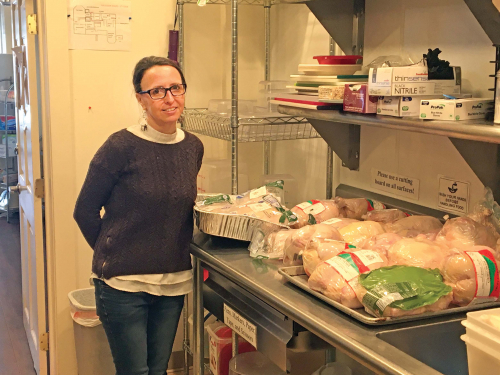Published on 2/4/2021 in the Addison County Independent. By John Flowers.
MIDDLEBURY — The Charter House Coalition’s (CHC) warming shelter at 27 North Pleasant St. is pushing through this nasty winter stretch with a new leader, added professional staff and a dedicated corps of volunteers who are ensuring homeless folks from all walks of life are kept warm and well fed during the ongoing COVID-19 pandemic.
Recently hired Executive Director Heidi Lacey on Feb. 1 provided this reporter with a masked, socially distanced tour of the remodeled shelter space, currently hosting 17 guests.
Prior to COVID, the shelter had been equipped to accommodate up to 40 persons (including families). But the facility must now conform to pandemic-related rules from Vermont Department of Health that have temporarily lowered capacity to 23 individuals. All guests have their own partitioned spaces. Yes, multiple guests can be situated in one room, but the partitioned slumber areas are each topped with a ceiling ventilation system that sucks used air out of the building to reduce the chance of disease transmission.
“Given all the circumstances, things are going very well,” said Lacey, who mixes compassion with an unwavering allegiance to the shelter’s COVID marching orders.
“We are not seeing the level of distress that other counties are seeing.”
Indeed, the Middlebury shelter has remained COVID-free during its pandemic run. And Lacey noted Vermont has done well as a whole; only six cases total among the state’s homeless population, with no deaths resulting. Comprehensive shelter-intake questionnaires, frequent temperature checks and strict hygiene standards are part of the success story.
There were, as of last month, an estimated 2,512 homeless people living in hotels paid for by the state’s General Assistance Emergency Motel Voucher Program, according to the Vermont Coalition to End Homelessness. That’s up from the 1,110 homeless people identified in the state’s annual “Point in Time” on Jan. 22, 2020.
Any Middlebury warming shelter guest showing the slightest symptoms of infection is sequestered in a special room with sophisticated ventilation. That guest is cared for in isolation — communicating with staff via walkie-talkies — until COVID-19 is ruled out.
Guests participate in a twice-per-day cleaning of all surfaces in the building.
The CHC has installed washers and dryers within the shelter to ensure guests can clean their clothes on-site.
“We ask people to keep their trips (outside of the shelter) for essential purposes only,” Lacey explained.
Regrettably, there are currently none of the “family style” meals that had been used to build camaraderie among shelter residents and staff. Hard-working kitchen staff — including some guests — prepare 300 boxed meals each day. It’s enough food for folks staying at the shelter, the approximately 80 additional homeless folks residing at local motels and hotels, and people who show up for the CHC’s free community meals.
And let’s be clear — these aren’t your airport-variety boxed meals. They feature a home-cooked protein and sides, along with dessert. Tasty by any standard.
Also temporarily gone is a “day station” the shelter used to host to provide the homeless guidance on services that could improve their housing and income situations. That advice now must be dispensed on a case-by-case basis, Lacey noted.
Shelter staff work in close partnership with area human services organizations. Not all of the guests’ needs can be met in-house, and the pandemic is exacerbating other challenges the homeless are facing.
“The mental illness we see is phenomenal,” Lacey said. “We’re also seeing an increase in addiction; relapses from sobriety are substantial.”
It also doesn’t help that affordable housing vacancies are few and far between in the county, according to Lacey.
LARGER STAFF
COVID has forced the CHC to fortify its paid staff because many of the organization’s volunteers are older and thus more vulnerable to the virus. There were three full-time staff members managing shelter operations before March 2020. It’s now up to 6.5 full-time-equivalent positions, including two outreach officials, charged with meeting the needs of homeless folks lodged at local motels.
State and federal grants are funding the outreach positions. And the CHC is blessed with donors who continue to come through with funds, food, furniture, clothing and other essentials for those who have next to nothing.
Jane Steele has remained a constant source of aid and comfort at the shelter through the pandemic. Her many volunteer roles include ordering all supplies for the facility. Self effacing by nature, Steele spreads the credit around.
“The participation of the residents themselves has been a godsend,” she said.
One of the shelter’s guests has been there for almost five years. But long stays are the exception, rather than the rule.
“There are usually extenuating circumstances,” Lacey said of lengthy stays. “Not every housing program works for everyone.”
It isn’t easy managing a shelter, even under normal circumstances. COVID-19 has thrown Lacey plenty of curveballs, and for the most part she’s been hitting them out of the park.
But not every case goes as smoothly as she’d like.
For example, the Independent recently reported the case of a homeless woman who declined help and spent the night of Jan. 12-13 in a snowbank next to the Middlebury police station. Lacey had worked with the woman — who suffers from mental illness — for four days prior to her stay outdoors. Counseling Service of Addison County officials also tried to help the woman, who as it turned out wasn’t deemed eligible for an emergency evaluation and involuntary committal.
The woman, Lacey explained, declined lodging at the warming shelter, and her behavior would have made for a tricky situation in a group setting. The woman had been evicted from the Middlebury motel where she had been staying.
“She had been adamant she didn’t want to be here,” said Lacey, who ended up giving the woman a ride to a South Burlington hotel that had agreed to accept her.
Providing care to the homeless population can indeed be a bumpy road, and the job is not for everyone. But Lacey can’t imagine herself doing anything else. She immediately applied for the job when she saw it advertised in early January. She’d been working as manager of shelter operations, and as a dispatcher for Middlebury police. Her résumé also includes stints as a sales executive with now-defunct Connor Homes, and as an administrator with various local construction businesses.
“I sang my heart out in the cover letter,” said Lacey in recalling her enthusiasm for the shelter job.
She interviewed, landed the job, and started on Jan. 14.
Every day brings something new, and that’s just fine with Lacey.
“We all come to work with smiles on our faces,” she said.

